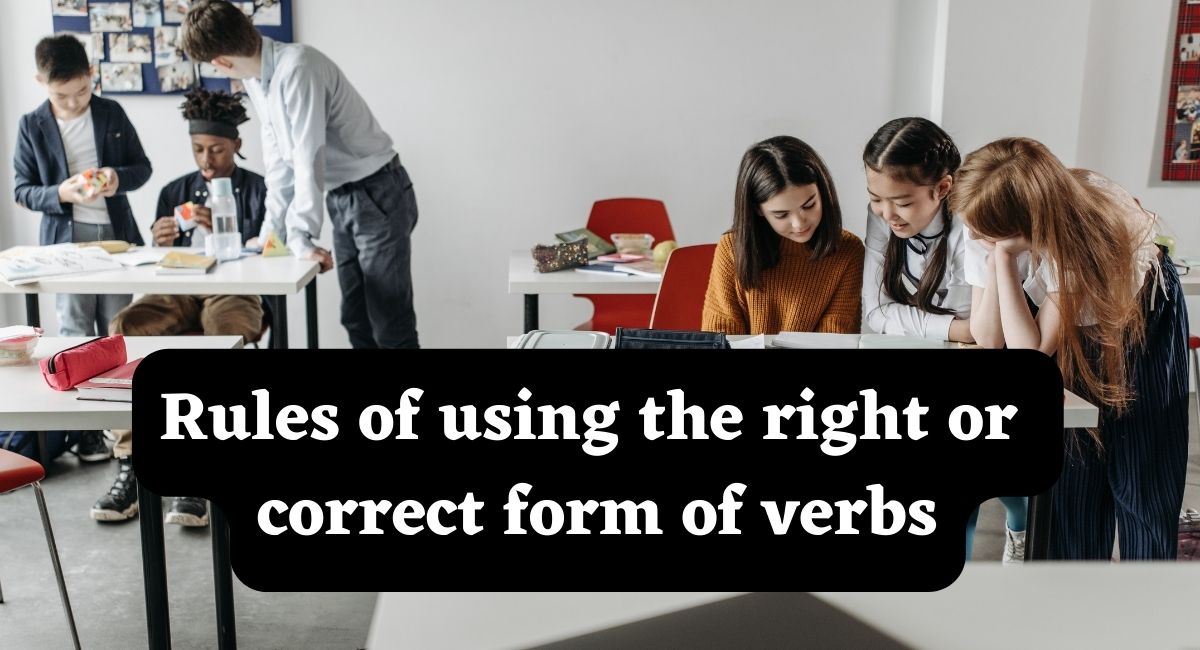Rules of using the right or correct form of verbs Part -2
The right form of verbs is one of the most important parts of English grammar. Those who have a good idea about tense will find this chapter very simple. This is one of the most important sections for all class English 2nd papers. You who are SSC and HSC candidates must memorize these rules. It will be useful in all your exams.
11. একই দৈর্ঘ্য, পরিমাণ বা স্থান বুঝালে subject দেখতে plural হলেও verb singular হয়।
Fifty miles is a long way.
12. Am, is, are, was, were ইত্যাদি to be verb- এর পর passive voice এর ক্ষেএে main verb-এর past participle হয়।
The book was stolen.
13. Modal auxiliary verb
যেমন : can, could, may, might, should, would, ought to, used to, must ইত্যাদি থাকলে মূল verb-এর present form হয়।
যেমন:
- He can (do) it easily. Ans.: He can do it easily.
- Everybody should (respect) his parents.
- Ans.: Everybody should respect his parents.
- It may (rain) today. Ans.: It may rain today.
14. সাধারণত sentence যদি ভবিষ্যৎ নির্দেশক শব্দ বা phrase যেমন: tomorrow, the day after tomorrow, in future, next ইত্যাদি থাকলে future indefinite tense হবে এবং verb-এর present form বসে।
যেমন:
- I (go) to Dhaka tomorrow.
- Ans.: I shall go to Dhaka tomorrow.
- He (join) there the next day.
- Ans.: He will join there the next day.
15. Sentence-এর subject singular number হলে verb singular হয় এবং subject plural হলে verb plural number হয়।
যেমন:
The taste of the mangoes (to be) sour.
Ans.: The taste of the mangoes is sour.
The flowers in the garden (to be) beautiful.
Ans.: The flowers in the garden are beautiful.
These papers (to be) printed.
Ans.: These papers are printed.
16. মূল verb-এর আগে to be বা having থাকলে verb-এর past participle form হয়।
যেমন:
A community centre is going to be (establish).
Ans.: A community centre is going to be established.
I do not mind (have) a cup of coffee.
Ans.: I do not mind having a cup of coffee.
He went home (have) his salary.
Ans.: He went home having his salary.
17. সাধারণত It is time, it is high time, wish ইত্যাদির পরে subject ও bracket-এ মূল verb থাকলে verb-এর past form হয়।
যেমন:
It is time you (finish) a course on the English language.
Ans.: It is time you finished a course in the English language.
I wish I (sing). Ans.: I wish I sang.
আবার, It is time, it is high time-এর পর যদি bracket-এ মূল verb থাকে, তবে ওই verb-এর আগে to বসবে এবং ওই verb অপরিবর্তিত থাকবে।
যেমন:
It is time (play). Ans.: It is time to play.
It is high time (stand) by the flood-affected people.
Ans.: It is high time to stand by the flood-affected people.
18. As if, as though, wish ইত্যাদি থাকলে subject-এর পরে be verb-এর পরিবর্তে were বসে।
যেমন:
He behaves as if he (be) a leader.
Ans.: He behaves as if he were a leader.
I wish I (be) a millionaire.
Ans.: I wish I were a millionaire.
19. As if, as though দ্বারা দুটি clause যুক্ত থাকলে প্রথম clauseটি Present tense হলে পরবর্তী clauseটি Past indefinite হয়। প্রথম clauseটি Past tense হলে পরের clauseটি Past perfect tense হয়।
যেমন:
He behaves as if he (buy) the car.
Ans.: He behaves as if he bought the car.
He spoke as though he (do) a great task.
Ans.: He spoke as though he had done a great task.
20. While যুক্ত sentence-এ while-এর পরে verb থাকলে verb-এর সঙ্গে ing যোগ হয়। আবার while-এর পরে subject থাকলে Past continuous tense হয়।
যেমন:
While (take) dinner, he received the phone.
Ans.: While taking dinner, he received the phone.
While I (play) in the field, I saw him coming.
Ans.: While I was playing in the field, I saw him coming.

